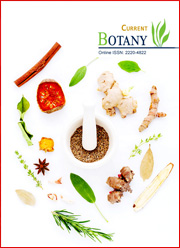Chemical mutagenic action on seed germination and related agro-metrical traits in M1 Dianthus generation
Abstract
Chemical mutagenesis is an efficient tool used in mutation breeding programme for improving various vital characteristics in floricultural crop, like Dianthus. In this study, colchicine (Col), ethyl methane sulphonate (EMS) and sodium azide (SA) with three different concentrations like 0.1%, 0.4% and 0.7% were used to analyze their effect on seed germination behaviour, lethality, pollen sterility and other related agro-metrical traits. Mutagen treated pure-line seeds were sown in experimental field following randomized block design (RBD) layout to raise first mutant (M1) generation. It was noted that increase in the dose of EMS and SA, germination percentage and survivability were decreased; whereas colchicine doses were proportional to increase germination percentage at seedling stage, but they were not survived till maturity. Higher lethality over control (32.89) was shown by 0.7% EMS. Pollen sterility also increased with increasing mutagenic doses. The maximum pollen sterility (61.1%) was observed under 0.7% colchicine. So, the effect of chemical mutagenesis on seedling and pollen sterility with EMS (especially 0.7%) treatment is much more beneficial as compared to colchicine and SA. 0.4% colchicine is effective for other agronomical characters. Hence these mutagens can be used for improving the germination behaviour and the metrical traits in Dianthus cultivar.






 .
.